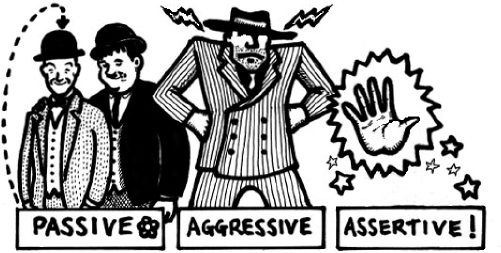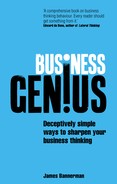The eighth Block and Limitation to Business Genius is awkward assertiveness.
This awkwardness, however, is perhaps to be expected, because no one is born assertive.
On the contrary.
If you were to snatch a toy away from a young child who was enjoying playing with it, for example, what do you think would happen?
Well, the chances are they’d:
- cry (i.e. go passive);
- have a temper tantrum (i.e. go aggressive);
- peer up at you with those pleading eyes (i.e. go manipulative); or
- say nothing to your face, but then sneakily snatch it back again when you’re looking the other way (i.e. go passive aggressive).
Anyway, the point is, what they’re highly unlikely to say is:
‘Excuse me, when you took my toy away from me like that, I felt sad and angry because I was enjoying playing with it. With this in mind, I’d appreciate it if you could return it instantly. In future, if you would like to borrow my toy, I suggest we discuss this rationally, calmly and in advance next time, so we can move towards a mutually beneficial outcome. In what ways could we potentially work together to help this happen?’
Why?
Because assertiveness is a social skill, and this means it’s a skill we need to learn.
And here lies the problem. Who on earth are we supposed to learn it from? Our parents? Our teachers? Our friends? (Mmm … no wonder so many businesses are fraught with people problems!)
Anyway, leaving that Pandora’s Box firmly closed for now, let’s take a look at three key learning points that can help you to UP! your assertiveness.
POINT 1 WHAT?
What does assertiveness mean? Well, according to Sue Bishop in her book Develop Your Assertiveness, it basically means rights. That’s to say, it means ‘standing up for your own rights without violating the rights of other people.’
Passive people, for example (like Stan Laurel of Laurel and Hardy fame) frequently ignore their own rights; aggressive people (like Sonny Corleone in Martin Scorsese’s The Godfather) frequently ignore others’ rights; assertive people, however, (like the BBC’s David Dimbleby, who’s been diplomatically chairing the political debate programme Question Time for many years) frequently respect both.
POINT 2 WHEN?
When is it appropriate to be assertive in business? The simple answer is often, but not always! Sometimes, you might need to be a little more aggressive (especially if you want to achieve aggressive sales results or ‘Swim with the sharks (without being eaten alive)’, as business author Harvey Mackay would say). Alternatively, at other times, you might need to be a little more passive (especially if you work in a ‘Yes, Chef!’ culture, where assertiveness is viewed as mutiny, and potentially career-limiting). Please be aware that ‘assertiveness’, as Sue Bishop also states, ‘is always a choice of behaviour.’ And this means, one of your rights includes your right not to be assertive! After all, Tom Cruise was amazingly forthright in the movie Jerry Maguire, but not everyone welcomed his refreshing honesty!
POINT 3 HOW?
How can assertiveness best be achieved? Well, we’ll explore this in more detail in a minute. Ultimately, however, the trick is to talk in paragraphs (as hinted at earlier). Yup. If you want to be assertive, bear in mind that it’s virtually always the longest option. If you want to be aggressive, for example, you can probably say what you want to say in two or three words like ‘Get stuffed!’ or ‘Go to hell!’ By contrast, if you want to go passive, you could probably get away without saying anything (and silently nod in agreement). Assertiveness, however, tends to take the most time …


UP! YOUR ASSERTIVENESS
NUGGET
In 1976 a housewife called Anita Roddick – from a little town called Littlehampton in the South of England – was left to bring up her two children alone while her husband Gordon trekked across the Americas.
Let’s face it, Roddick could easily have turned passive and wallowed in self-pity, but she didn’t. Likewise, she could easily have turned manipulative, and put emotional pressure on her husband to curtail his trip immediately, but Roddick had brighter ideas.
She decided to set up a brand new business called The Body Shop (to help her pay the bills) instead, and her innovative cosmetics concept went on to become a resounding success with its ‘2,045 stores serving more than 77 million customers in 51 different markets in 25 different languages and across 12 time zones.’
In this light, it’s fair to say that Anita Roddick – the ‘capitalist with a conscience’ (to quote journalist James Macintyre of The Independent ) – was a prime example of ‘assertiveness in action’ for three main reasons:
- Firstly, she wasn’t afraid to stand up for the rights of working mothers, demonstrating how it was perfectly possible for a mother to pay her way in the world by tapping into the power of her ingenuity.
- Secondly, she wasn’t afraid to stand up for the rights of animals, too, choosing only to sell products that hadn’t been tested on them.
- Finally – as we discover in her 1991 autobiography Body and Soul – she wasn’t afraid to stand up for the rights of all ethical entrepreneurs, by championing the idea of ‘profits from principles’, assertively stating: ‘We are proving that you can be successful and still keep your sense of soul, you can make a profit and still be a force for social change …’

USEFUL TIPS AND
ESCAPE STRATEGIES
If you genuinely want to UP! the quality of your assertiveness, here are three practical tips and strategies that can help:
1 ALWAYS USE ‘ISA’
ISA is a simple three-step process – recommended by Cathy Birch in her book Asserting Your Self: How to feel confident about getting more from life – that stands for Identify, State, Ask, and here’s how it works:
- Firstly, you identify the specific behaviour you’re not too happy about (because this will help you to keep personal remarks out of it).
- Secondly, you state the effect it’s had – or is having – on you (because this will enable you to steer clear of arguments about the truth, for you’ll be describing the situation only as you see it, from your perspective).
- Thirdly, you ask for the change you’d most like to happen (because clear signposting will make it infinitely easier for the other person to see what it is you want them to do differently).
And that’s basically it, rather like this:
- Identify: ‘When you were late for our meeting last Thursday, which started at 2.30 pm …’
- State: ‘ I felt let down because I was relying on you being there to introduce the new project to the rest of the team …’
- Ask: ‘In future, please can you let me know if you are going to be running late, so I can plan around it …’
By the way, ISA can also be very useful if you’re a manager who’s just about to give an appraisal or performance review to someone who’s not great at taking feedback, because it can help you to structure your conversation in a systematic and non-confrontational way.
2 TARGET THE MIDDLE
In Sweden, there’s a wonderful word – lagom – which basically means ‘not too much’ and ‘not too little’. And in many ways this sums up assertiveness.
Assertiveness is all about keeping everything you say, and everything you do, bang in the middle. And this is because assertiveness is all about the middle ego state (i.e. the adult ego state), which is all about being rational, objective, neutral and keeping emotions well and truly out of it!
Like lagom, therefore, it means not being too loud, and not being too quiet.
It means ‘keeping your head on straight’ (as they say in psychology) because aggressive people tend to jut their heads forward, whereas manipulative people tend to tilt their heads to one side.
And here’s a weird one. I’ve come across assertiveness experts who suggest we ‘keep our eyebrows straight!’ Yup, if you think about it, when we get angry our eyebrows tend to end up looking like the letter V, yet if we go passive they tend to look more like an arch or a rainbow …
3 FORGET POWER GAMES
There are times when it’s relatively easy to be assertive. For example, if you know your subject, you’re working with amazingly approachable people, or if there are no grey areas, such as when you have the law behind you, like an environmental health officer (who has the authority to close down a restaurant instantly if the owner fails to comply with specific standards).
Other times, however, it can be hard. For example, if you’re dealing with someone who’s intimidating, or unpredictable, if you feel like a fish out of water, if you need to give bad news, or perhaps if you’re so nice you don’t like to say no.
Whatever the context, if you’re keen to gain ‘mastery in the emotional domain’ (as Daniel Goleman writes about in his 1995 classic Emotional Intelligence) it’s a good idea to have your own strategy for staying centred in highly challenging circumstances.
So here’s one that might intrigue you: always think Gurkha!
Yes, I know it sounds a bit crazy, but mental visualisation (or what psychologists call visual motor behaviour rehearsal) can often help if you want to come across as appropriately powerful in a tense situation.
After all, why is it that ex-Gurkha soldiers are increasingly being recruited as security guards by top business people in the UK and elsewhere? Well, largely because these brave kukri-wielding fighters from the steep hills of Nepal appear to excel at handling conflict situations asssertively (rather than aggressively like a nightclub bouncer, passively, or manipulatively).
In other words, they’re able to stay strong and stand up for their rights under extreme pressure, yet also to remain restrained, too. For as Dilli Gurung – an ex-Gurkha and experienced security guard I know – recently told me, much of this assertiveness comes from a blend of honesty, discipline and pride: ‘We Gurkhas proudly remember and respect our prestige, and this prestige gives us a big moral to work strongly and effectively.’

So, please bear this in mind, within the context of the work you do: If you want to UP! your assertiveness, value who you are and value what you do.
Or, as Cathy Birch makes clear: ‘Assertiveness begins with a sense of self-worth. When we value ourselves we have no need for power games.’
To round up, however, here are few extra insights, which may also be of interest:
- Please don’t assume that passives are so meek and gentle that they are never angry. (Passives can often be very angry – inside – but simply do not show it.)
- Please don’t assume that aggressives are only ever loud, red in the face and point a lot, like the monster boss in The Devil Wears Prada. (Aggression can take many shapes and forms. Some people, for example, can be aggressive with silence, or with an icy cold stare. In fact – according to Roberta Cava in her book Dealing with Difficult People – everything from ‘gossip’ to ‘sarcasm’, and even eye-ball rolling, can be indirect forms of ‘aggression’ in the workplace!)

BUSINESS GENIUS IN ACTION:
NEXT STEPS …
In summary, if you want to UP! your assertiveness, here’s how:
- Pinpoint what rights you, and others, have at work (to help you appreciate what’s acceptable behaviour, and what isn’t).
- Investigate what assertiveness is not (for the sharper your understanding of what makes passivity, aggression and manipulation so different, the better placed you’ll be to act on it).
- Leverage the power of ISA (by identifying the problem behaviour you’re not happy with, stating the effect it’s having on you and your team, and then asking for the change you’d most like to see in future. Yes, it’ll definitely seem robotic, and you’ll end up having to talk in paragraphs but, if done well, it can help).
- Orchestrate a plan to ‘think Gurkha!’ (so you can avoid petty power games and develop your sense of self).
- Target the middle (by keeping everything you do and say in the middle, including your eyebrows!).
And, once again, remember that too much assertiveness can be career-limiting, so please choose your moment.

UP!SPIRATION
‘Courage is found in unlikely places.’
J. R. R. Tolkien (English writer, poet, philologist and university professor)

